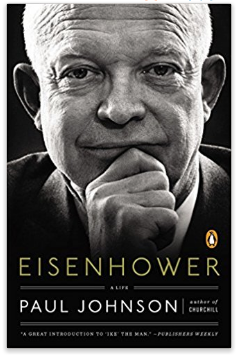I recently read “Eisenhower: A Life” by Paul Johnson. Below are the quotes I found most interesting. If you like the quotes, buy the book here.
 “The report should have made unnecessary the subsequent investigation, marred by acrimonious disagreements between the police and the attorney general. But unfortunately, little of it was reproduced in the press. What Ike learned from this episode was the absolute necessity to keep journalists well informed and friendly, and the lesson was one he applied with outstanding success throughout his public career.” (14)
“The report should have made unnecessary the subsequent investigation, marred by acrimonious disagreements between the police and the attorney general. But unfortunately, little of it was reproduced in the press. What Ike learned from this episode was the absolute necessity to keep journalists well informed and friendly, and the lesson was one he applied with outstanding success throughout his public career.” (14)
“MacArthur would dismiss Ike as “the apotheosis of mediocrity” and “a highly literate nincompoop.” (17)
“He was offensive minded, and he always concentrated on the opportunities rather than the difficulties in any given situation.” (20)
“His formula was simple: careful, conservative dress, uniform freshly pressed. Always stand erect. Square your shoulders. Hold your head high. Speak bluntly but clearly. Use homely expressions. Look the camera straight in the eye.” (29)
“Jim Hagerty, Ike’s press secretary at the White House, said that “Being President Eisenhower’s press secretary was as easy and likeable a job as you could possibly imagine.” He made things cozy. At his very first press conference, he told the reporters: “You are quasi members of my staff. Part of the team.” (29)
“Ike went on the record with this definition of an intellectual: “A man who takes more words than is necessary to tell more than he knows.” (66)
“The United States at midcentury was unarguably the most powerful nation on earth. It was the largest petroleum producer in the world and supplied more oil than the rest of the world’s nations together. It harvested one third of the world’s grain and half its cotton. It was the world’s largest producer of phosphates, iron ore, zinc, lead, copper, salt and precious metals, including uranium. It had 90 percent of the world’s natural gas production… Almost half of the world’s manufactured goods came from the United States.” (77)
“Ike did not exactly choose to mislead people about his abilities, but when they underrated him, he certainly made no attempt, as a rule, to correct their impression. He seems to have found it convenient and useful for people to get him wrong. He chuckled within himself.” (82)
“Ike recorded in his diary: “No one should be appointed to political office if he is a seeker after it.”” (93)
“Ike consistently misled the press not so much on specific matters but in giving a general impression that he worked much less than he did. He felt that if he made reporters believe he spent as much time as possible on the golf course, they would not push him too hard on particular issues and would et him get away with vagueness.” (95)
“Things are often unsure. “Deliberate ambiguity and deception” were the key. He wanted as many options as possible all the time, and he got them.” (103)
“Ike summed up: America is a rich country. Provided we can avoid war, keep tension low, and avoid absurdly high defense budgets, we will prosper, sure enough.” (108)
“Ike was not color conscious. He was not exactly color-blind either. He tended to take the view that acute color problems usually grew out of wide disparities of wealth and that rising prosperity would reduce them to a tolerable level. His job, as president, was to keep the wealth flowing, to ensure that it was widely distributed and that Americans sw the system as, broadly speaking, “fair.” (118)
“He thought the United States was known in the world for its military strength rather than its uniqueness as a democratic haven of freedom. The military strength, and imprudent leadership, could lead the country into interventions all over the world, encouraged by the arms lobby and the military chiefs who were its puppets, and the result would be an overextension of resources and economic ruin.” (120)
“Ike said that someone had to defend the economy as a whole because “it is the nature of our government that everyone, except for a thin layer at the top, is working knowingly or unknowingly, to damage our economy, the reason being that they see the need for more and more resources for their own service or agency, and the valuable results that can be achieved through added effort in their own particular element.” (122)
Liked the quotes? Click here to buy the book.

